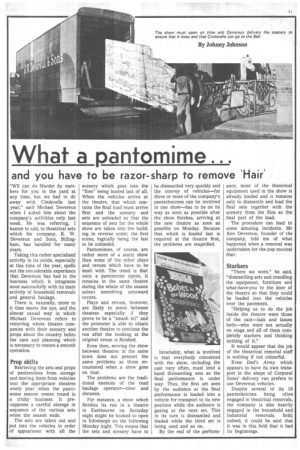What a pantomime ...
Page 13

If you've noticed an error in this article please click here to report it so we can fix it.
and you have to be razor-sharp to remove 'Hair'
"WE can do Murder by numbers for you in the yard at any time, but we had to do away with Cinderella last year," said Michael Devereux when I asked him about the company's activities only last week. He was referring,. I hasten to add, to theatrical sets which his company, K. W. Devereux and Sons, Billingham, has handled for many years.
Taking this rather specialised activity in its stride, especially at this time of the year, spells out the considerable experience that Devereux has had in the business which it integrates most successfully with its main activity of household removals and general haulage.
There is, naturally, more to it than meets the eye, and the almost casual way in which Michael Devereux refers to removing whole theatre companies with their scenery and props about the country belies the care and planning which is necessary to ensure a smooth operation.
Prop shifts
Retrieving the sets and props of pantomimes from storage and moving them from vehicles into the appropriate theatres every year when the pantomime season comes round is a tricky business. It presupposes a careful storage in sequence of the various sets , when the season ends.
The sets are taken out and put into the vehicles in order of appearance with all the scenery which goes into the "flies" being loaded last of all. When the vehicles arrive at the theatre, that which contains the final load must arrive first and the scenery and sets are unloaded so that the sequence of sets for the whole show are taken into the building in reverse order; the first scene, logically being the last to be unloaded.
Pantomimes, of course, are rather more of a static show than some of the other plays and revues which have to be dealt with. The trend is that once a pantomime opens, it remains in the same theatre during the whole of the season unless something untoward occurs.
Plays and revues, however, are likely to move between theatres especially if they prove to be a "smash hit" and the promoter is able to obtain another theatre to continue the run after the booking at the original venue is finished.
Even then, moving the show between theatres in the same town does not present the same problems as those encountered when a show goes on tour.
The problems are the traditional enemies of the road haulage operator—time and distance.
For instance, a show which finishes its run in a theatre in Eastbourne on Saturday night might be booked to open in Edinburgh on the following Monday night. This means that the sets and scenery have to be dismantled very quickly and the convoy of vehicles—for three or more of the company's pantechnicons can be involved in one show—has to be on its way as soon as possible after the show finishes, arriving at the new theatre as soon as possible on Monday. Because that which is loaded last is required at the theatre first, the problems are magnified.
Invariably, what is involved is that everybody concerned with the show, including the cast very often, must lend a hand dismantling sets as the final performance is under way. Thus, the first set seen by the audience at the final performance is loaded into a vehicle for transport to its new position while the audience is gazing at the next set. This in its turn is dismantled and loaded while • the third set is being used and so on.
By the end of the perform ance, most of the theatrical equipment used in the show is already loaded and it remains only to dismantle and load the final sets together with the scenery from the flies as the final part of the load.
The procedure can lead to some amusing incidents. Mr Ken Devereux, founder of the company, told me of what happened when a removal was undertaken for the pop musical Hair.
Starkers
"There we were," he said, "dismantling sets and trundling the equipment, furniture and what-have-you to the door of the theatre so that they could be loaded into the vehicles over the pavement. , "Helping us to do the job inside the theatre were those of the cast—lads and lasses both—who were not actually on stage and all of them completely starkers and thinking nothing of it."
It would appear that the job of the theatrical removal staff is nothing if not colourful, Even Dad's Army which appears to have its own transport in the shape of Corporal Jones' delivery van prefers to use Devereux vehicles.
Despite several of its 18 pantechnicons being often engaged in theatrical removals, the company is also heavily engaged in the household and industrial removals field; indeed, it could be said that it was in this field that it had its beginnings.




















































